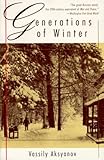 It would be a shame if the death of the Russian novelist Vasily Aksyonov yesterday got lost in the welter of cultural losses that surrounds it. Aksyonov is one of the towering literary figures of the postwar era – one who might have been more widely recognized as such were it not for the strictures of Soviet publishing culture. In his novels The Burn, The New Sweet Style, and especially Generations of Winter (which we have championed at this site), Aksyonov synthesized the Tolstoyan legacy of the 19th Century with the innovating impulses of the revolutionary generation. In making Russian literary tradition his own, and re-opening its dialogue with the rest of world literature, he pointed the way for the novelists who would succeed him. I can think of no more fitting way to honor him than to read him.
It would be a shame if the death of the Russian novelist Vasily Aksyonov yesterday got lost in the welter of cultural losses that surrounds it. Aksyonov is one of the towering literary figures of the postwar era – one who might have been more widely recognized as such were it not for the strictures of Soviet publishing culture. In his novels The Burn, The New Sweet Style, and especially Generations of Winter (which we have championed at this site), Aksyonov synthesized the Tolstoyan legacy of the 19th Century with the innovating impulses of the revolutionary generation. In making Russian literary tradition his own, and re-opening its dialogue with the rest of world literature, he pointed the way for the novelists who would succeed him. I can think of no more fitting way to honor him than to read him.









